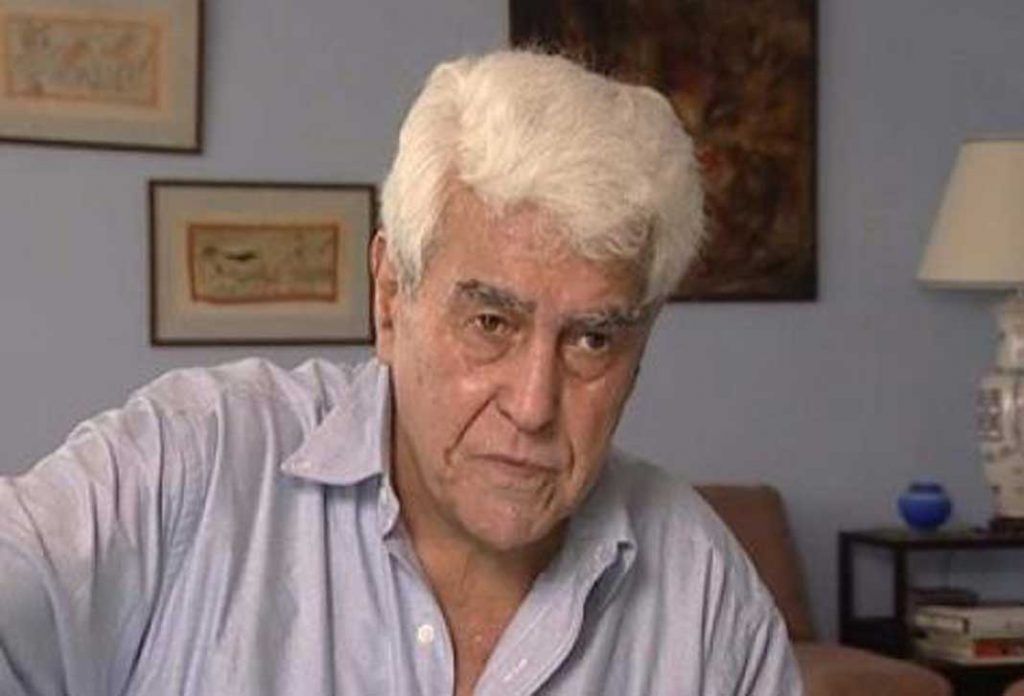Monday, October 10, 2016
Muhammad Safa Haeri, professionally known only as Safa Haeri, has just passed away in exile in Paris, aged 79. He was one of the best-known members of a second generation of Iranians who developed journalism into a proper profession from the 1940s onwards.
The first generation, including people like Jose Mazandi, Ali Mehravari, Parviz Raein, Najfaqoli Pessyan, Ali Jalali, Farrokh Kayvani and Esmail Pourvali did much to elevate the status of journalist, most specially the reporter, in a traditional society that regarded journalism as a peripheral, if not slightly dishonorable, profession.

By the time the second generation, that to which Safa belonged, came forward, journalism was already established as a respectable profession with reporters as its stars. Men like Ali Bastani, Ali-Akbar Kheirkhah, Muhammad Boluri, Parviz Naqibi and women like Pari Abasalti, Sima Dabir-Ashtiani and Mansureh Pirnia helped to heighten the prestige and authority of reporters as purveyors of unalloyed news.
“Safa” as he was known to his friends was born in a family of religious scholars hailing from Mazandaran with branches in Yazd, Mash’had and Najaf. Having taken French as his foreign language at Firuz-Bahram Secondary School, in the mid-1950s Safa was sent to Paris for further studies. Soon, however, his insatiable thirst for adventure trumped whatever academic ambitions he might have had and he joined the French Foreign Legion then engaged in the Algerian War of independence. Unable to identify with the French cause while failing to develop any sympathy for the Algerians, Safa left the legion and after what he called “ a brief vagabondage” in Africa and Europe returned home.
Safa landed a job as translator with the state-owned Pars news Agency while also working as stringer for Agence France Presse which had just sent a permanent correspondent, one Monsieur Jean-Claude Berard to Tehran. Making use of his brief experience in Africa he also wrote a number of features on the Algerian war, then in its final phases, for the weekly magazines Kavian and Bamshad.
As Pars News Agency’s star reporter, Safa covered a number of official trips by the late Shah and Queen Farah and senior officials including the prime minister and foreign minister. In 1970 he joined the daily French-language Joural de Teheran, published by the Ettelaat Group, as Diplomatic Correspondent while also contributing to the then newly established Persian-language daily Ayandehgan. He covered the Indo-Pakistan war of 1970 and the Egyptian-Israeli war of 1973.
In 1973 he was recruited by the National Iranian Radio and Television (NIRT) and posted to Beirut as Middle East Correspondent. There, he created a vast network of contacts that included Palestinian leader Yasser Arafat and Imam Mousa Sadr, an Iranian mullah sent by the Shah to lead the Lebanese Shiites.
His dispatches from the region, including many from Damascus and Cairo helped a larger audience of Iranians get acquainted with the Arab-Israeli conflict without the usual constraints of emotional attachments and prejudices.
Safa was later assigned as Asia Correspondent based in Hong Kong with a brief to watch China’s then dicey attempts at rejoining the world of normality. Safa’s reporting on China provided Iranian audiences with some of the first accounts of the way the Asian “giant” was trying to absorb its Communist experience and seek a proper place in the community of nations.
When the clerics seized power in Tehran in 1979, the new Islamic revolutionary regime asked Safa to remain in his post in Hong Kong putting him in an uneasy and ambiguous situation. Later he was recalled to Tehran. Safa moved back to Tehran where he continued his work with AFP. Within 10 months, he moved to Paris with a wait-and-see agenda which they believed would take no more than a few months. However, the few months morphed into years and then decades and the couple reorganised their mental landscape gearing it to the idea of permanent exile.
In exile, Safa did some stringing for various opposition groups, including a stint as international affairs analyst for a radio program broadcast from Baghdad with one of his old Ettelaat colleagues Touraj Farazmand as Editor-in-Chief. He also wrote analytical pieces for another radio program beamed from Cairo under the supervision of an NIRT veteran Iraj Gorgin. In the 1980s, Safa also contributed to Ruzegar-Now (New Epoch), a magazine published by his old friend and boss Esmail Pourvali in Paris.
One of the first Iranian journalists to learn to use the Internet, Safa launched Iran Press Service (IPS), the first privately owned Iranian web newspaper, which was to live for almost three decades. IPS was a much appreciated source for access to the work of others as expertly selected by Safa. At the same time, Safa’s additional commentaries and footnotes to the texts that he selected helped IPS readers with a better understanding of the context.
In his later years Safa enjoyed his life as a retired journalist dedicated to his family, friends and colleagues.
[responsivevoice_button voice=”US English Female” buttontext=”Listen to this “]

